The Rambling Trap: When Stories Lose Their Power
Picture this scenario: An interviewer asks about a challenging project you managed. You start strong, setting the scene with enthusiasm. But then you remember another detail, which reminds you of a related situation, which leads to a tangent about office dynamics, and suddenly you're five minutes in with no clear point in sight.
This rambling trap catches countless candidates off guard. It happens because we naturally want to provide context and show our thoroughness. However, what feels comprehensive to you sounds unfocused to the interviewer. They're listening for specific evidence of your capabilities, not a detailed chronicle of your entire professional journey.
The challenge intensifies when you're passionate about your work. Your excitement to share meaningful experiences can actually work against you if it lacks structure. Interviewers appreciate enthusiasm, but they need clarity even more.
The Team Player Paradox: Losing Yourself in "We"
Here's a contradiction that trips up many professionals: You want to show you're collaborative and team-oriented, so you emphasize group achievements. “We implemented a new system,” “We increased sales by 30%,” “We solved the client's problem.” It sounds humble and team-focused, right?
The problem is that interviewers need to understand your specific contributions. When everything becomes “we did this” and “we accomplished that,” your individual value gets lost in the collective success. This is particularly challenging for naturally modest candidates who feel uncomfortable highlighting their personal achievements.
Cultural backgrounds can amplify this issue. In many cultures, emphasizing individual contributions over team success feels inappropriate or boastful. However, competency-based interviews specifically aim to understand what you personally bring to the table.
The Context Overload: When Background Becomes the Story
Some candidates believe that providing extensive context demonstrates their analytical thinking and attention to detail. They spend considerable time explaining organizational structures, market conditions, and historical background before addressing the actual question.
While context matters, excessive setup can overwhelm your core message. Interviewers typically have limited time and specific competencies they need to evaluate. When the setup takes longer than the actual example, you risk losing their attention and failing to demonstrate the skills they're assessing.
This mistake often stems from good intentions - you want to ensure the interviewer fully understands the complexity of your situation. However, too much background can actually diminish the impact of your achievements by burying them in unnecessary details.
The Weak Ending: Stories Without Clear Results
Many candidates excel at describing situations and actions but stumble when explaining outcomes. They might say something vague like “It went well” or “Everyone was happy with the result” without providing concrete evidence of success.
This weak ending undermines otherwise strong examples. Competency-based interviews focus on results because they indicate your ability to deliver value in future roles. Without clear outcomes, even impressive actions lose their persuasive power.
The challenge often lies in quantifying results that seem intangible. How do you measure improved team morale or enhanced client relationships? Many candidates avoid discussing results because they can't provide specific numbers, missing opportunities to showcase their impact.
The Missed Learning Moment: Forgetting the Growth Element
Perhaps the most overlooked aspect of strong interview responses is reflection. Many candidates conclude their stories after describing results, missing the chance to demonstrate self-awareness and continuous improvement.
This oversight is significant because employers highly value professionals who learn from experiences and adapt their approaches over time. When you skip the reflection element, you present yourself as someone who executes tasks without deeper consideration of process improvement or personal development.
The ability to articulate lessons learned and how they influenced future performance shows maturity and a growth mindset, qualities that distinguish exceptional candidates from merely competent ones.
The Path Forward: Structure as Your Secret Weapon
These pitfalls share a common thread: they all stem from a lack of structure in your responses. When you don't have a clear framework for organizing your thoughts, it's easy to ramble, lose focus on your individual contributions, over-contextualize situations, provide weak conclusions, or forget to reflect on learnings.
The good news? These issues are entirely preventable. Professional interviewers recognize structured, well-crafted responses immediately. When you can consistently deliver clear, compelling examples that highlight your specific contributions and demonstrate your growth, you stand out in ways that generic qualifications simply cannot achieve.
Your experiences have already prepared you for success. The question isn't whether you have valuable stories to tell; it's whether you know how to tell them in a way that captures their full impact and demonstrates your unique value.
Every challenge you've overcome and every achievement you've earned represents potential interview gold. The difference between candidates who struggle and those who excel often comes down to presentation, not substance.
Remember: the right structure doesn't limit your authenticity, it amplifies it. When you can clearly articulate your experiences and growth, you gain confidence that extends far beyond any single interview room.
Don’t miss this in-depth session with Impactpool coach Merlijn Angad Gaur! Learn what to expect in a competency-based interview and discover strategies to approach it with confidence.
